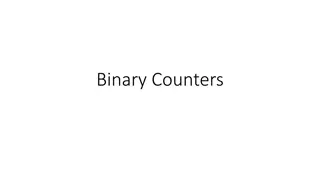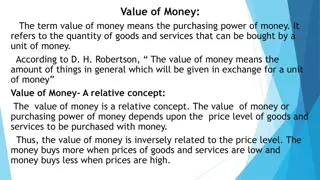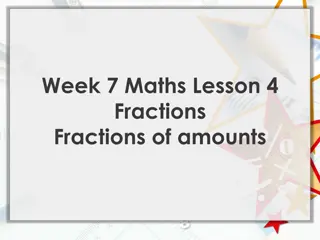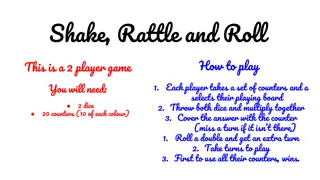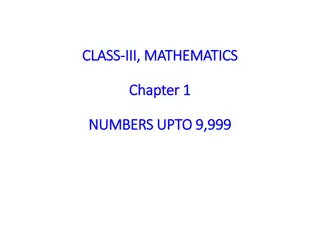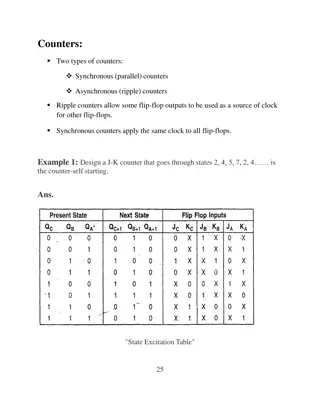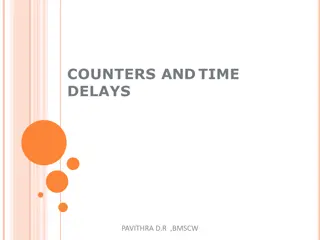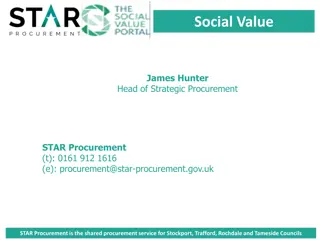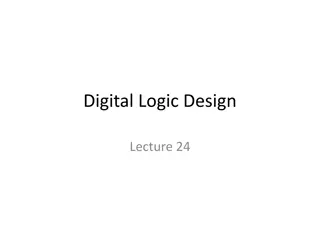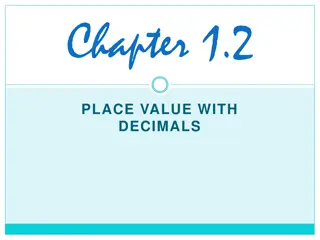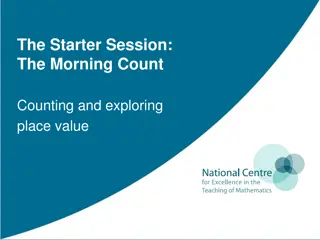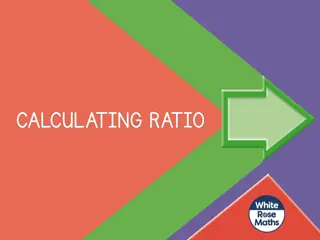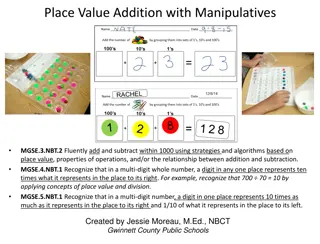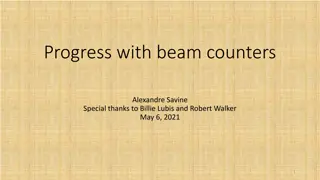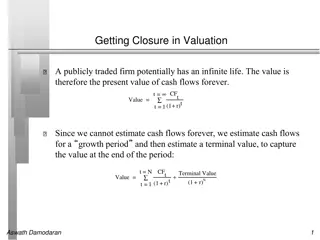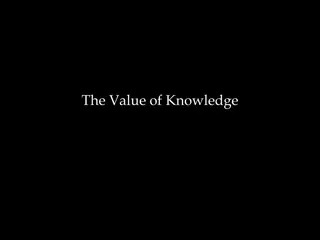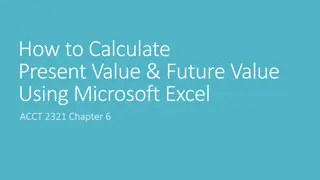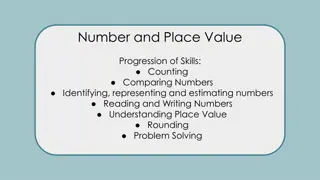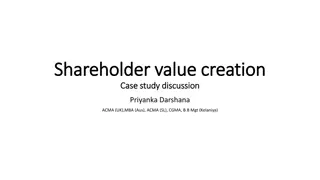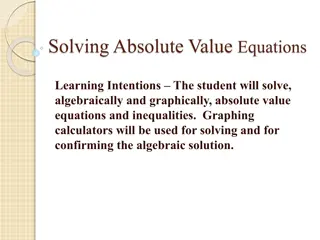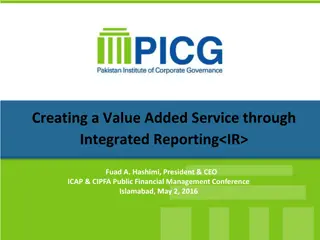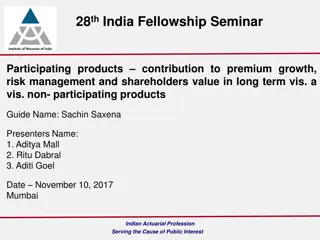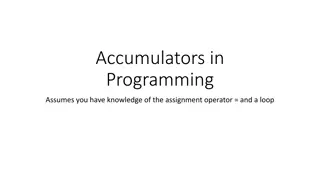ANALOG AND DIGITAL ELECTRONICS 21CS33
Explore the world of analog and digital electronics through the lens of registers, counters, and flip-flops. Dive deep into the operation of these components, learn how to transfer data between registers, build and analyze shift registers, construct timing diagrams, and understand binary counters. D
0 views • 112 slides
ECC Social Value Reporting and Evaluation Framework
Essex County Council (ECC) has implemented a robust Social Value Reporting and Evaluation framework based on the Local Government Association's National TOMs method. This framework categorizes and assesses social value contributions in two parts - Value Score and Supporting Statement Score - to deri
3 views • 16 slides
Understanding Binary Counters and Types of Counters
Binary counters are registers used to count clock pulses, while binary counters follow the binary number sequence. There are two types of counters: serial/asynchronous counters and parallel/synchronous counters. Serial counters change output flip-flop to next flip-flop, requiring minimal hardware bu
12 views • 21 slides
Understanding the Value of Money and Standards
The value of money refers to its purchasing power, which is influenced by the price level of goods and services. Different standards, such as wholesale, retail, and labor, help measure the value of money. Money can have internal and external value, affecting domestic and foreign transactions. The Qu
0 views • 62 slides
Understanding Fractions: Week 7 Maths Lesson
Dive into fractions of amounts with engaging activities like matching representations to statements, finding percentages of numbers, using place value counters, and more. Enhance your skills in identifying equal groups, filling in calculations, and reasoning with fractions. Strengthen your math flue
0 views • 19 slides
Shake, Rattle and Roll: Exciting 2-Player Dice Game
Dive into the fun 2-player game of Shake, Rattle, and Roll where players multiply dice rolls to cover answers on the board with counters. The first player to use all their counters wins the game! Get ready for a strategic and engaging gameplay experience. Create your own boards for endless entertain
0 views • 5 slides
Understanding Place Value in Mathematics
Explore the basics of place value, from ones to thousands, and learn how to expand a numeral into its place values. Discover the power of each place in a number and write numerals in expanded form to understand the value of each digit. Dive into the concept of place value through images and explanat
0 views • 23 slides
Understanding Place Value in Numbers
Introduction to the concept of place value in numbers, covering topics such as the value of each digit, place value calculation, successors, predecessors, period division, ascending/descending order, and the importance of numbers in everyday life. Explained through examples and visuals, this educati
0 views • 26 slides
Understanding Synchronous and Asynchronous Counters in Digital Electronics
Explore the concepts of synchronous (parallel) and asynchronous (ripple) counters in digital electronics, where ripple counters enable clock sharing among flip-flops and synchronous counters apply the same clock to all. Learn to design J-K and up-down counters using flip-flops with examples and stat
1 views • 4 slides
Understanding Counters in Sequential Circuits
Counters in sequential circuits are crucial components used for counting clock cycles and measuring time intervals. They are composed of flip-flops that progress through a sequence of states based on clock pulses. This sequential circuit has no inputs other than the clock pulse and relies on its int
1 views • 22 slides
Understanding Counters and Time Delays in Electronics
Explore the fundamental concepts of counters and time delays in electronic systems as explained by Pavithra D.R. from BMSCW. Learn about the design and operation of counters, time delay procedures, label states, time delay using register pairs, flowcharts for time delays, and illustrative programmin
5 views • 10 slides
Understanding Sequential Counters in Digital Circuits
Sequential counters, comprised of flip-flops, are essential in digital circuits for counting clock cycles. They advance through states based on clock pulses and can measure time intervals. The circuit's output state solely depends on its present state, with transitions occurring at each clock pulse.
0 views • 22 slides
Enhancing Social Value through Strategic Procurement
STAR Procurement, the shared service for multiple councils, emphasizes the importance of Social Value in procurement practices. The Social Value Portal serves as a management tool to measure and demonstrate the benefits of Social Value commitments. Bidders are required to provide quantitative and qu
0 views • 14 slides
Winners of #PressforProgress Photo Contest - Celebrating Talented Photographers!
Discover the talented winners of the #PressforProgress Photo Contest, showcasing exceptional photographers from Sri Lanka. Ayesha Bulathgama clinched 1st place with her captivating work, followed by retired Central Bank official Ranjani Perera in 2nd place, and journalist Indunil Usgoda Arachchi in
1 views • 9 slides
Digital Logic Design Lecture on Registers and Counters
In this lecture, we covered topics on Registers and Counters in digital logic design. Registers are used to hold information within a digital system, while Counters are utilized to produce specified output pattern sequences. Different types of registers such as shift registers were discussed along w
0 views • 25 slides
Understanding Decimals: Place Value and Reading Practice
Learn about decimal place value, types of decimals, how to read decimals, understanding mixed decimals, and practicing decimal exercises, including writing decimals in words and identifying digits in place value charts.
1 views • 10 slides
Exploring Place Value in Morning Counting Sessions
Morning counting sessions for children involve exploring place value, tricky tens numbers, and applying understanding of place value through activities. Children learn to recognize and interpret numbers such as 139, understand the concept of tens, and enhance their fluency with place value in a fun
0 views • 5 slides
Ratios in Different Scenarios
Explore and solve various ratio-related problems involving counters, bees, spiders, bread rolls, ladybirds, and spiders. From determining the number of red counters given the ratio to finding out the quantity of bread rolls in multiple baskets based on the provided ratio, these exercises help streng
1 views • 18 slides
Integrated Value Creation in Corporate Finance
Explore the concept of integrated value creation in corporate finance, emphasizing the importance of managing for long-term value while incorporating social and environmental goals. Learn about responsible management practices that focus on creating net present value (NPV) through a balance of finan
0 views • 38 slides
Mastering Portable Exhibition Counters From Setup to Stand Out Success
This presentation offers a detailed guide on mastering portable exhibition counters for trade shows and events. It covers essential topics such as selecting the right counter, effective branding strategies, setting up for success, and engaging visito
1 views • 12 slides
Place Value Addition with Manipulatives for Elementary Students
Engage elementary students in hands-on learning activities to fluently add and subtract within 1000 using place value manipulatives. The materials and procedures provided allow for a deep understanding of place value concepts and support the development of strategies and algorithms based on place va
0 views • 25 slides
Progress with Beam Counters: Alexandre Savine
In this update, progress with beam counters is highlighted, giving special thanks to individuals involved. Details on timing resolution, weighting schemes, iterative procedures, and sample comparisons are discussed. The journey towards optimal filtering and accurate calculations unfolds in the realm
0 views • 12 slides
Understanding Terminal Value in Valuation
Valuation of publicly traded firms with potentially infinite lives involves estimating cash flows for a growth period and a terminal value to capture value at the end. The stable growth rate, which cannot exceed the economy's growth rate, plays a crucial role in determining the present value of futu
0 views • 8 slides
Maximizing Customer Value, Satisfaction & Loyalty in Business
Explore the essence of customer value, satisfaction, and loyalty in business success through Dr. Ananda Sabil Hussein's insightful perspective. Learn about customer perceived value, determinants of value, steps in value analysis, loyalty definitions, satisfaction measurements, and the significance o
0 views • 18 slides
The Value of Knowledge: A Philosophical Exploration
Exploring the value of knowledge through the lens of Plato's Meno Problem, this text delves into why knowledge is considered more valuable than mere true belief. It discusses Plato's solution to the problem, the secondary and tertiary value problems, and constraints on solutions and strategies in un
0 views • 22 slides
How to Calculate Present Value & Future Value Using Microsoft Excel
Learn how to calculate present value and future value using Microsoft Excel functions such as PV and FV. Understand the syntax, arguments, and examples for determining the value of single amounts, annuities, and lump sums. Step-by-step instructions provided for efficient financial calculations.
0 views • 14 slides
Exploring Land Value Return and Recycling for Transportation Funding
With transportation investment needs surpassing available resources, investigating the potential of land value return and recycling as a revenue source can benefit public agencies. This involves recovering and reusing a portion of the increased land value generated by public investment in transporta
0 views • 33 slides
Understanding Decimal Place Value through Visual Representation
Explore the concept of decimal place value with the help of interactive images showing numbers represented in a place value grid. Practice identifying numbers based on the value of tenths, hundredths, ones, and tens columns. Improve your understanding of decimals by visualizing and interpreting the
0 views • 16 slides
Progression of Number and Place Value Skills Across Grade Levels
Explore the progression of skills related to number and place value, including counting, comparing numbers, identifying digits, reading and writing numbers, understanding place value, rounding, and problem-solving. The curriculum spans Year 1 to Year 6, covering topics such as counting forwards and
0 views • 5 slides
Maximizing Shareholder Value Creation Through Strategic Business Practices
Explore the concept of shareholder value creation, the importance of generating revenues exceeding economic costs, and meeting shareholders' expectations. Learn about Economic Value Added (EVA), key value drivers, aligning strategy with value creation, and essential factors for overall business succ
0 views • 11 slides
Understanding Trade in Value-Added (TiVA) and Global Value Chains
Trade in Value-Added (TiVA) offers crucial insights into the complexities of global value chains and economic globalization. By shifting focus from gross trade statistics to value creation along supply chains, TiVA helps in formulating better policies and addressing systemic risks associated with ma
0 views • 22 slides
Advancements in Counting Algorithms for Multiprocessing Systems
Presentation of key concepts and advancements in counting algorithms for multiprocessing systems, focusing on topics like max registers, counters, and monotone circuits. Discusses the importance of efficient counting in achieving consensus, crash failure requirements, and lower bounds for time compl
0 views • 20 slides
Economic Foundations of Imperialism: Exploitation and Value Transfer
Imperialism primarily functions as an economic mechanism for exploiting value rather than seeking political dominance. The transfer of value occurs through mechanisms like unequal exchange, global value chain flows, and capital flows, leading to the long-term appropriation of value by imperialist na
0 views • 28 slides
Hardware Performance Monitoring with Kernel Modules
This document explores the use of hardware performance counters and cycle counting on x86 and ARM architectures for monitoring and analyzing system performance. It covers topics such as the utilization of hardware counters, cycle counting on x86 processors, and the ARM Performance Monitor Unit (PMU)
0 views • 12 slides
Understanding Absolute Value Equations and Inequalities
In this lesson, students will learn to solve absolute value equations and inequalities both algebraically and graphically. The concept of absolute value, which represents the distance between a number and zero on the number line, is explained through examples and solutions. The importance of using g
0 views • 43 slides
Best Trade Show Counters & Podiums: 6 Trendy Picks for Your Next Exhibition
Discover the top 6 trade show counters and podiums that will elevate your exhibition display. From stylish designs to practical features, find the perfect solution for boosting client engagement and brand presence at your next event.
2 views • 10 slides
Business Model Reporting for Value Creation
Integrated Reporting (IR) plays a crucial role in forging business partnerships and facilitating sound decision-making. Understanding the organizational business model is essential for long-term sustainability and value creation. The global approach to business model reporting encompasses business s
0 views • 42 slides
India Fellowship Seminar: Product Contributions to Growth, Risk Management, and Shareholder Value
India Fellowship Seminar discussed the contributions of participating and non-participating products to premium growth, risk management, and shareholder value. Key topics included market trends, drivers of shareholder value, PAR vs NPAR attractions, creating shareholder value, and risk management st
0 views • 21 slides
Understanding Accumulators in Programming
Accumulators are a fundamental concept in programming where a variable holds the total of several values by continuously updating its value through operations like addition or concatenation. This concept is often used in loops to keep track of cumulative results or occurrences, akin to using a calcu
0 views • 4 slides
Understanding Place Value of Large Numbers in Virginia SOL 4.1
This resource provides a teacher-led presentation to help students identify the place value of digits in whole numbers up to millions according to the Virginia Standard of Learning (SOL) 4.1. It includes activities for reading large numbers, identifying periods, and assessing student understanding.
0 views • 38 slides


